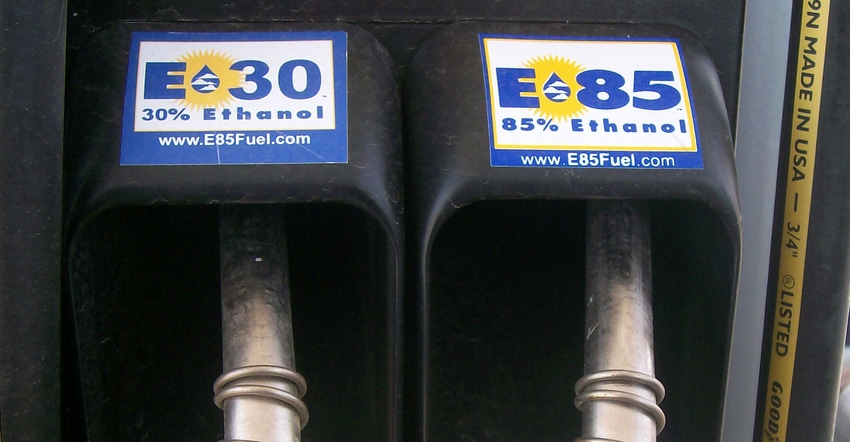USDA to invest $100m in biofuel infrastructure
Grant program designed to expand availability and sale of renewable fuel blends, including E15 and E85.

U.S. Agriculture Secretary Sonny Perdue announced that the U.S. Department of Agriculture intends to make available up to $100 million in competitive grants for activities designed to expand the availability and sale of renewable fuels.
USDA is making the grants available under the Higher Blends Infrastructure Incentive Program (HBIIP). The program is intended to increase significantly the sale and use of higher blends of ethanol and biodiesel by expanding the infrastructure for renewable fuels derived from U.S. agricultural products.
“America’s energy independence is critical to our economic security, and President [Donald] Trump fully recognizes the importance of our ethanol and biofuels industries and the positive impacts they deliver to consumers and farmers with an affordable, abundant and clean burning fuel,” Perdue said. “American ethanol and biofuel producers have been affected by decreased energy demands due to the coronavirus, and these grants to expand their availability will help increase their use during our economic resurgence.”
HBIIP consist of up to $100 million in funding for competitive grants or sales incentives to eligible entities for activities designed to expand the sale and use of ethanol and biodiesel fuels. Funds will be made directly available to assist transportation fueling and biodiesel distribution facilities with converting to higher ethanol and biodiesel blends by sharing the costs related to and/or offering sales incentives for the installation of fuel pumps, related equipment and infrastructure.
The agriculture industry has been highly challenged in recent years by low prices, historic weather conditions and unfavorable trade dynamics. With COVID-19 creating additional, unprecedented hurdles, the HBIIP will help provide a long-term boost for agricultural markets, POET, the nation's largest ethanol producer, said in a statement.
This program takes an important first step in expanding market access to affordable, American-made biofuels across the nation, resulting in additional clean fuel options for motorists and economic opportunities for rural America - a true win for everyone,” POET founder and chief executive officer Jeff Broin said.
Higher blends, like E15, have the potential to increase ethanol consumption by 7 billion gal. each year, thereby increasing corn demand by 2 billion bu. annually. “E15 is the equivalent of doubling exports for corn farmers,” Broin noted. While more work will be needed to achieve the market benefits of full E15 adoption, HBIIP is an important step in realizing this increased demand.
The American Coalition for Ethanol (ACE) is focusing its market development efforts, including the fuel marketer-focused website flexfuelforward.com, on ensuring that fuel marketers know about the funding and receive any assistance they need to participate. ACE senior vice president and market development director Ron Lamberty provided insight to USDA during the initial HBIIP stakeholder meeting and has been in close consultation with the USDA since then.
“ACE is gratified to see many policies we recommended to USDA to make the program more accessible to single-store and small chain operators were included in the final program,” Lamberty said. “In particular, we appreciate the Targeted Assistance Goal (TAG), which makes approximately 40% of funds available specifically for applicants owning 10 fueling stations/locations or fewer.” USDA is also offering applicants "consideration for geographical diversity and markets underserved by higher blends" to help establish higher blend retail facilities in a broader geographic area, which ACE identified as critical to widespread E15 use in its recommendations to USDA.
“A very high percentage of existing stations could add E15 using mostly existing equipment, and USDA is structuring these grants so all fuel retailers — including single-store and small chain owners — can receive assistance, whether they need to perform simple conversions, upgrades or new infrastructure,” Lamberty said. "Widespread E15 use is going to rely on conversions more than new construction, and ACE will focus on helping stations determine compatibility so they can add higher ethanol blends as quickly as they are able. Retailers may also need assistance with the application process, which USDA has assured us has been simplified as much as possible for a federal grant program. ACE will be helping retailers navigate the grant process by providing expertise, and when needed, financial assistance to give stations the best chance of receiving grant funding."
Grants for up to 50% of total eligible project costs, but not more than $5 million, are available to vehicle fueling facilities, including, but not limited to, local fueling stations/locations, convenience stores, hypermarket fueling stations, fleet facilities, fuel terminal operations, midstream partners and/or distribution facilities.
USDA plans to make available approximately $86 million for implementation activities related to higher blends of fuel ethanol and approximately $14 million for implementation activities related to higher blends of biodiesel. Higher biofuel blends are fuels containing more than 10% ethanol by volume and/or more than 5% biodiesel by volume.
Renewable Fuels Assn. president and CEO Geoff Cooper stated, “U.S. ethanol producers today are facing the worst economic conditions in the industry’s 40-year history due to COVID-19, and they need immediate emergency relief to survive this catastrophe. Once the pandemic is over and fuel markets are showing signs of recovery, expanding infrastructure via the Higher Blends Infrastructure Incentive Program will be important to the long-term future of the ethanol industry and rural America.”
About the Author(s)
You May Also Like





